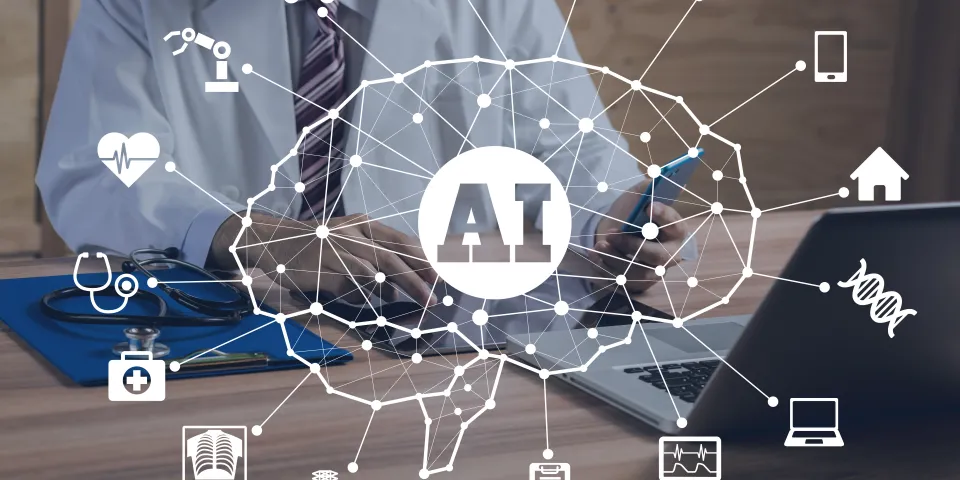Latest
4 Ways AI Is Transforming the Healthcare Industry
Mar 20, 2018

Artificial intelligence is reshaping our world as we know it – and now it’s coming to healthcare. Does that mean your next doctor will be a robot? Will AI replace healthcare jobs of the future?
Not quite. Artificial intelligence means that machines can learn by analyzing patterns in large amounts of data. You’re probably familiar with voice assistants like Siri, Google Home and Alexa, which use artificial intelligence to respond to basic queries and commands, and become in sync with your daily routine over time.
Many industries have already begun to adopt artificial intelligence technology to streamline processes and improve business results. For example, Amazon transformed ecommerce by tailoring the shopping experience based on an individual’s search history and product preferences.
AI has incredible potential to revolutionize the healthcare industry – from personal health management to diagnoses and treatment.
Here are four ways we’re already seeing AI at work in healthcare:
1. Wearable technology
AI-enabled fitness devices are making it easier for individuals to understand and make decisions about their own health. For example, wearable fitness trackers allow you to see how your daily activities match up against your health goals. Some devices can even make recommendations based on certain daily milestones.
Wearable health technology encourages an individual to be more proactive about maintaining a healthy lifestyle. Over time, proper health management could reduce that person’s risk of developing a chronic illness, such as heart disease or diabetes.
2. Personalized medicine
Personalized medicine, also known as precision medicine, is the ability to tailor treatment to meet patients’ individualized needs, rather than applying a one-size-fits-all approach.
AI makes it possible for companies identify subtle patterns and trends within vast amounts of patient data. Rather than relying on results from a small patient pool, scientists can use that data to inform research and development for new drugs, resulting in better patient outcomes.
In a recent survey of global pharmaceutical industry leaders, 92 percent identified precision medicine as an opportunity and 84 percent of respondents said that precision medicine was a part of their corporate agenda.
3. Early detection and diagnosis
AI is also improving medical imaging technology and making it easier to detect cancer and other diseases in their early stages.
Consider this: The American Cancer Society reports that more than 12 million mammograms are performed every year in the United States. Nearly one-half of women who are tested receive a false positive test result, which could lead to misdiagnosis.
But, according to a report from PwC, AI is already making the review and translation of mammograms 30 times faster with 99% accuracy, reducing the need for unnecessary biopsies and stress associated with misdiagnosis.
4. Data management
The electronic exchange of patient health data has increased exponentially in the last decade, including the introduction of electronic health records (EHR) and a proliferation of online health management tools and resources. A breach in the security that patient data could have long-lasting effects on an organization’s reputation.
For healthcare organizations, that means investing in technology that can keep patient data under wraps. AI-enabled security systems can help organizations continually improve detection of security breaches and accelerate response times.
The proliferation of electronic patient data has also contributed to a growing demand for specialists who can code and digitize patient records, as well as health information professionals to manage the entire process and check for accuracy and security.
Begin making your mark - discover our health information management program
Bureau of Labor Statistics (BLS), U.S. Department of Labor, Occupational Employment and Wage Statistics 2023 / Occupational Outlook Handbook 2022. BLS estimates do not represent entry-level wages and/or salaries. Multiple factors, including prior experience, age, geography market in which you want to work and degree field, will affect career outcomes and earnings. Herzing neither represents that its graduates will earn the average salaries calculated by BLS for a particular job nor guarantees that graduation from its program will result in a job, promotion, salary increase or other career growth.
Latest
Recent Blog Posts
Subscribe to our Newsletter
Get the latest news you need to know, from study hacks to interview tips to career advancement. Have it delivered right to your inbox biweekly.








